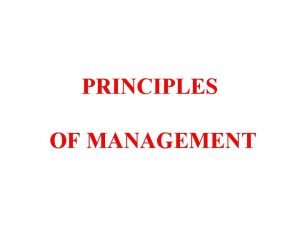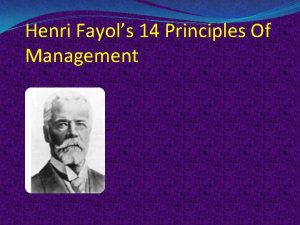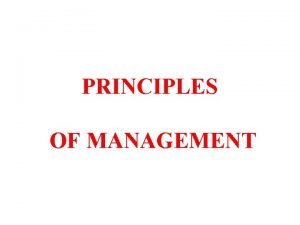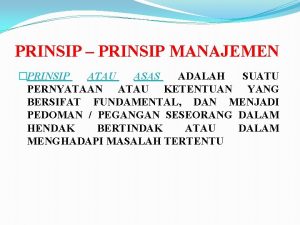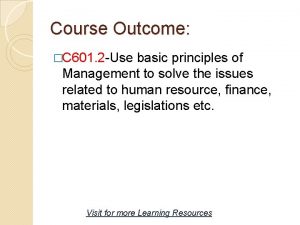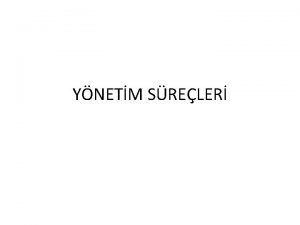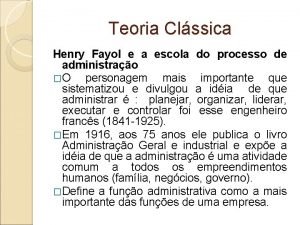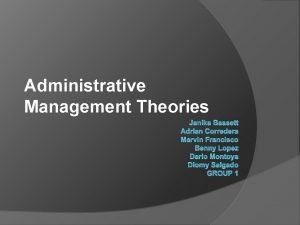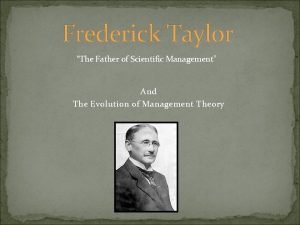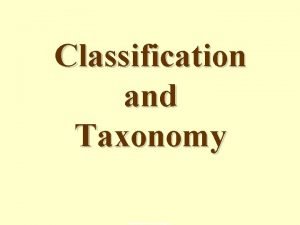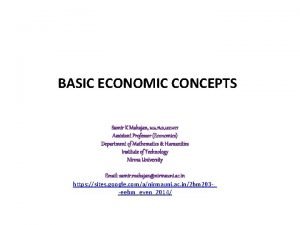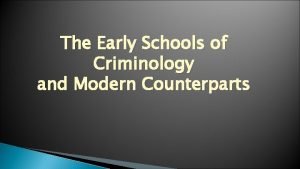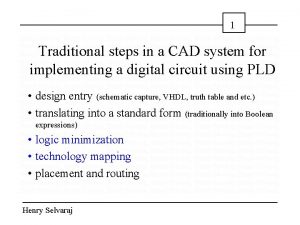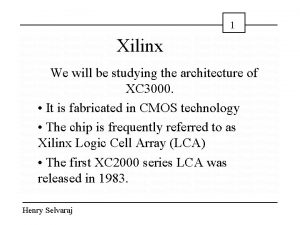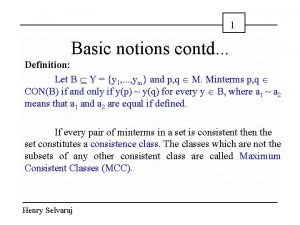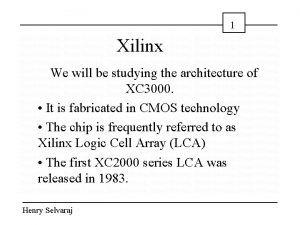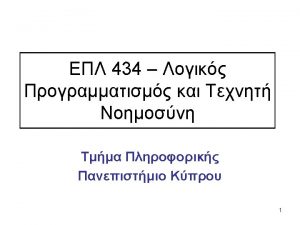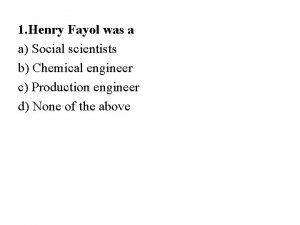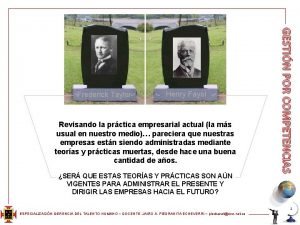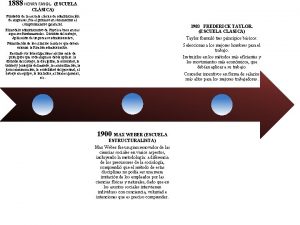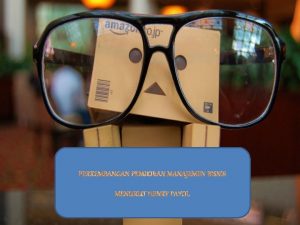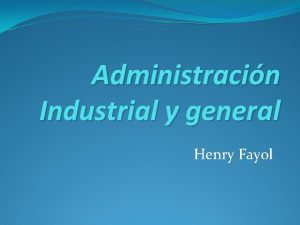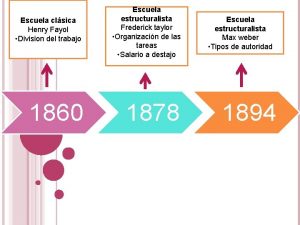PRINCIPLES OF MANAGEMENT Henry Fayol father of modern



























- Slides: 27

PRINCIPLES OF MANAGEMENT

• Henry Fayol - father of modern management. • F. W Taylor -father of scientific Management.

• According to Henry Fayol – To manage is to forecast and to plan, to organise, to command, to coordinate and to control.

Management is a set of activities (including planning and decision making, organizing, leading, directing and controlling) directed at an organization's resources (human, financial, physical, and information) with the aim of achieving organizational goals in an efficient and effective manner.

Management is a process for the utilization of minimum input for the production of maximum output.

Nature of Management • • 1. Universal Phenomenon 2. Distinct process 3. Social process 4. Management is what management does 5. Organised or group activity 6. Management of people 7. Getting things done through people 8. Integrating process

9. Goal –oriented 10. Dynamic 11. Good leadership 12. Management at different levels 13. Management is inborn as well as acquired ability. 14. One of the factors of production 15. Productive utilization of resource 16. Need for organization 17. Directing and controlling

18. Intangible 19. Multi-disciplinary 20. Science as well as an art 21. Management is a profession

1. Universal Phenomenon • Management is a universal phenomenon or process. It is present not only in business undertakings, but also in political, social, religious, charitable and educational institutions.

2. Distinct process • Management is a process, function or activity. It is a distinct. As a process, it includes a serious of actions or operations deliberately undertaken. It is concerned with • 1. Determination of the aims or objectives of the enterprise. • 2. Formulation of the plans and policies to help in the achievement of the objectives of the enterprise. • 3. Bringing together the various factors of production, such as men, materials, machines, money, methods etc. and putting them into efficient working order

3. Social Process • Management is a social process. It is a social process, in the sense that is takes place only through people. , and is concerned with relations among the people.

4. Management is what management does • Management can do anything and everything it wants. Generally, management performs functions like planning, organizing, staffing directing, co-ordinating, communicating and controlling.

5. Organized or group activity • Management comes into existence only when there is an organized or group activity towards a common objective.

6. Management of people • Management inspires and motivates the personnel to put forth their best efforts

7. Getting things done through people • Management is the art of getting things done through people in formally organized groups.

8. Integrating process • The task of management is the welding or integrating into a single working force the human and physical resources.

9. Goal -oriented • Management is concerned with the achievement of the pre-determined objectives of the organization. In fact, the success of management is measured by the extent to which the organization goals are achieved.

10. Dynamic • Management is dynamic, and not static. That is, management itself to change in environment, and also initiates and introduces changes in the activities of management. In fact, the success or failure of an organization is judged by the quality of decisions taken by the managers.

11. Good leadership • Ability to lead and get the desired course of action from the subordinates • 12. Management at different levels. • Top level Middle level and lower level

13. Management is inborn as well as acquire ability • Management is an inborn ability. That is managers are born and not made by imparting training. But today management is considered not only as an inborn ability but also an acquired ability by proper training.

14. One of the factor of production • Management is one of the factor of production like land, labour and capital. It is one of the economic resource or factors of production, because like land, labour and capital, managerial skills also have to be acquired and used for the production of goods or services.

15. Productive utilisation of resource Management is concerned with the best utilisation of the available resources

16. Need for organisation • Management uses the organisation for achieving the objectives determined by administration

17. Directing and controlling • Management deals particularly with the actual directing of human efforts.

18. Intangible • Management is intangible that is, cannot be seen with the eyes. It is evidenced only by the quality of the organisation and the results, Such as the increased moral of the subordinates, increased productivity, etc.

19. Multi-disciplinary • Management is a separate discipline or subject, it draws ideas and concepts from various disciplines, such as economics, statistics, mathematics, operations research, engineering, behavioral science, psychology, sociology, anthropology, ecology, history, accountancy, etc.

20. Science as well as an art. • Management has a systematized and organized body of knowledge. • It has certain principles which have been evolved through observation, experimentation, experience and inference.
 Management is inborn and acquired ability
Management is inborn and acquired ability Plank
Plank Henri fayol 14 principles of management
Henri fayol 14 principles of management Henri fayol principles
Henri fayol principles Teori organisasi klasik menurut henry fayol
Teori organisasi klasik menurut henry fayol 14 prinsip manajemen menurut henry fayol
14 prinsip manajemen menurut henry fayol Henry fayol was a renowned
Henry fayol was a renowned Eşgüdümleme nedir
Eşgüdümleme nedir Teoria classica de fayol
Teoria classica de fayol Aportaciones de fayol
Aportaciones de fayol Henry fayol yönetim ilkeleri
Henry fayol yönetim ilkeleri 14 principles of henri fayol
14 principles of henri fayol Henri fayol administrative management
Henri fayol administrative management General and industrial management
General and industrial management Frederick taylor is the father of
Frederick taylor is the father of Father of modern pharmacy
Father of modern pharmacy The father of the modern periodic table
The father of the modern periodic table The father of modern rocketry
The father of modern rocketry Symbolic of the rise of physical education in sweden.
Symbolic of the rise of physical education in sweden. Siyam na diwata ng sining (nine muses) (1994)
Siyam na diwata ng sining (nine muses) (1994) Aramaic lord's prayer
Aramaic lord's prayer Copyright
Copyright Who is the father of modern economics
Who is the father of modern economics Classical school of thought
Classical school of thought Father of internal medicine
Father of internal medicine Father of marketing
Father of marketing What is the olympic creed
What is the olympic creed Father of genetics
Father of genetics
